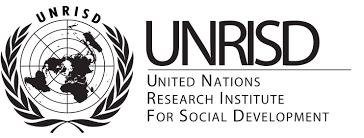Our Mission
The United Nations Research Institute for Social Development (UNRISD) is an autonomous research institute within the UN system that undertakes multidisciplinary research and policy analysis on the social dimensions of contemporary development issues.
Through our work we aim to ensure that social equity, inclusion and justice are central to development thinking, policy and practice. To this end, we:
focus on the often neglected social content and impacts of development processes and the role of social institutions, relations and actors in shaping development policies and pathways;
engage researchers, policy makers and civil society actors from around the world in generating and sharing knowledge, in order to shape policy within and beyond the UN system;
mobilize and strengthen the research capacity of individuals and institutions in developing countries through collaborative inquiry; and
provide a space for the exchange of ideas, giving prominence to marginalized viewpoints, often challenging mainstream development thinking and offering alternative policy options.
Our Mandate
UNRISD was established in 1963 as an autonomous space within the UN system for the conduct of policy-relevant, cutting-edge research on social development that is pertinent to the work of the United Nations Secretariat; regional commissions and specialized agencies; and national institutions.
Members:
Resources
Displaying 1 - 5 of 8Conflicting Priorities in the Promotion of Gender Equality in Ethiopia; Uneven Implementation of Land Registration and the Impact on Women’s Land Rights
The current Ethiopian government originated in a Marxist revolutionary movement, which early in its struggle against the Derg regime recognized the widespread discrimination against women in Ethiopian society and placed gender emancipation at the centre of its revolutionary strategy.
Gender and Agriculture after Neoliberalism?
A workshop was organized on 19-20 July 2012 to help the United Nations Research Institute for Social Development (UNRISD) and the Graduate Institute for International and Development Studies (IHEID) assess knowledge gaps and define new perspectives to understand the relationship between the rapidly changing policy landscape, and transformations of gender power relations in the countryside.
An institutional analysis of biofuel policies and their social implications: lessons from Brazil, India and Indonesia
This paper examines how developing countries have attempted to promote rural development through biofuel production, what social outcomes those strategies have created and what lessons can be learned. This is done by comparing the contexts of Brazil, India and Indonesia; three countries with important agricultural sectors that have put large-scale biofuel programmes in place. The analysis indicates a disparity between the social discourse and the adopted biofuel policy instruments.
Land Tenure Reform and Gender Equity
Recent UNRISD research finds that the new generation of land tenure reforms introduced in the 19990s is not necessarily more gender equitable than earlier efforts, even though women’s ability to gain independent access to land is increasingly on the statutes.
For or Against Gender Equality? Evaluating the Post-Cold War ‘Rule of Law’ Reforms in Sub-Saharan Africa
The paper explores whether the post-Cold War rule of law reform agenda in sub-Saharan Africa has enhanced or impeded gender equity. Argues that a large part of the gender equality agenda remains unaddressed by the legal and institutional reforms undertaken so far. The section on reforms to property laws suggests that they have at worst deepened gender inequality and at best left biases intact. Official discussion of gender and land tenure remains disconnected from broader processes of economic restructuring.




